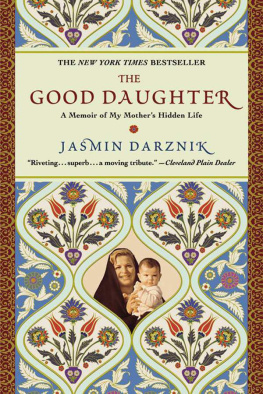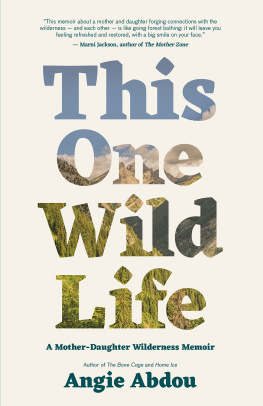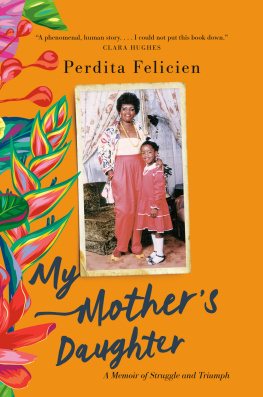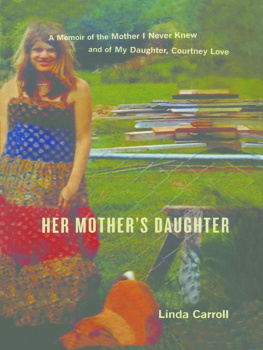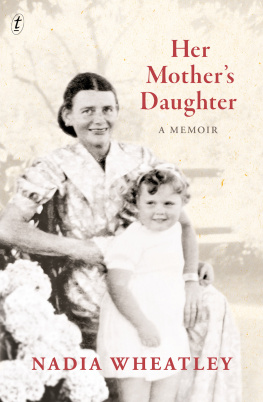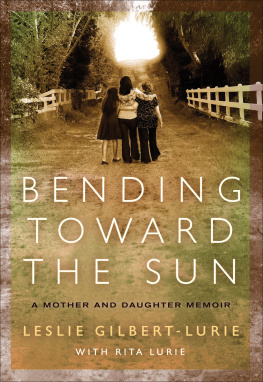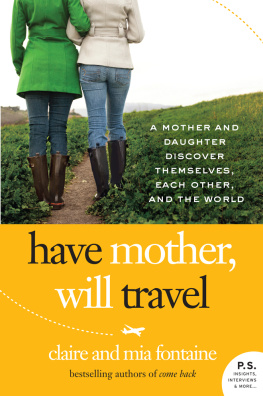Jasmin Darznik - The Good Daughter: A Memoir of My Mother’s Hidden Life
Here you can read online Jasmin Darznik - The Good Daughter: A Memoir of My Mother’s Hidden Life full text of the book (entire story) in english for free. Download pdf and epub, get meaning, cover and reviews about this ebook. year: 2011, publisher: Grand Central Publishing, genre: Non-fiction / History. Description of the work, (preface) as well as reviews are available. Best literature library LitArk.com created for fans of good reading and offers a wide selection of genres:
Romance novel
Science fiction
Adventure
Detective
Science
History
Home and family
Prose
Art
Politics
Computer
Non-fiction
Religion
Business
Children
Humor
Choose a favorite category and find really read worthwhile books. Enjoy immersion in the world of imagination, feel the emotions of the characters or learn something new for yourself, make an fascinating discovery.
- Book:The Good Daughter: A Memoir of My Mother’s Hidden Life
- Author:
- Publisher:Grand Central Publishing
- Genre:
- Year:2011
- Rating:3 / 5
- Favourites:Add to favourites
- Your mark:
- 60
- 1
- 2
- 3
- 4
- 5
The Good Daughter: A Memoir of My Mother’s Hidden Life: summary, description and annotation
We offer to read an annotation, description, summary or preface (depends on what the author of the book "The Good Daughter: A Memoir of My Mother’s Hidden Life" wrote himself). If you haven't found the necessary information about the book — write in the comments, we will try to find it.
The Good Daughter: A Memoir of My Mother’s Hidden Life — read online for free the complete book (whole text) full work
Below is the text of the book, divided by pages. System saving the place of the last page read, allows you to conveniently read the book "The Good Daughter: A Memoir of My Mother’s Hidden Life" online for free, without having to search again every time where you left off. Put a bookmark, and you can go to the page where you finished reading at any time.
Font size:
Interval:
Bookmark:


For my mother and grandmother

So many friends, family members, and colleagues have supported, guided, and (more than occasionally) prodded me along in the writing of this book.
Linda Watanabe McFerrin gave me the courage to begin and for this I owe her my first thanks. In addition to leading me to Linda, Book Passage in Corte Madera, California provided me a wonderful community in which to read, learn, and write, and its impossible for me to imagine The Good Daughter without that community.
Kelly Sonnack devoted early enthusiasm and unwavering attention to this memoir. I am grateful also to David Groff for his astute guidance. Sandy Dijkstra and the whole Dijkstra teamElise Capron, Andrea Cavallaro, Natalie Fischer, Elisabeth James, and Taylor Martindalehave been enormously helpful to me at every turn.
For her uncommon patience and keen insights, I thank my editor, Caryn Karmatz Rudy. Thanks also to my publisher, Grand Central, and to Amanda Englander, who helped me send this book into the world. Ive been very lucky, too, in my editors at Random House UK, Vanessa Neuling and Drummond Moir, who read draft after draft.
Id like to acknowledge the wonderful organizations that supported this book: The Marin Arts Council, San Francisco Foundation, Intersection for the Arts, A Room of Ones Own Foundation, Community of Writers at Squaw Valley, Norman Mailer Writers Colony, and the Steinbeck Fellowship Program at the Martha Heasley Cox Center. In addition to the financial resources they extended for the project, they put me in contact with many of the mentors and fellow writers Ive mentioned here.
Endless thanks go out to Rebecca Foust, whose friendship makes me believe in fate. She and my friends Shahdeh Shooshdary, Amy Motlagh, Sue-Ellen Speight, Mahta Jahanshahi, Marie Ostby, and Eileen Kane were my first devoted readers. Jahanshah Javid, editor of iranian.com, gave me my first writing gig. Persis Karim and the members of the Association of Iranian American Writers continually inspired me with their camaraderie.
I am also particularly grateful to my son, Kiyan Darznik-Banaee. His inimitable spirit gives me joy every day.
And thanks, finally and profoundly, to my mother for the honesty, wisdom, and generosity with which she shared her story with me.

Prologue
L ike all the photographs that came with us when we left Iran, this one was as supple and as thick as leather. Its edges were tattered and a long white crease coursed through the image. I might easily have mistaken it for just another old photograph, but this one was nothing like the others.
The girl in it was my mother, Lili, and though she couldnt be older than fourteen, someone had rimmed her eyes with kohl and darkened her mouth with a lipstick so deep it looked black in the picture. Her dress was satin, pulled taut across her torso and pinched at the waist, and her shoulders turned in awkwardly where a wedding veil skimmed her body. The man at her side was not my father. Id never seen him before. He wore a gray fedora with his tuxedo and his right hand encircled my mothers waist with surprisingly elegant fingers.
A bride, I realized with a start, shed once been this strangers bride.
Nearly as astonishing as this revelation was my mothers expression in the photograph. Eyes fixed on the distance and lower lip pouting, she looked as if the next shot would have shown her crying. I had never known my proud Iranian mother to look like that.
I sat stunned, gripping the photograph between my thumb and forefinger, unable to look away. I was sitting in my mothers house, a house to which Id never imagined Id return. It was late in the afternoon, five weeks after my fathers funeral; I was helping her go through his things and this photograph had fallen from a stack of letters whose Persian script my eyes could no longer follow. A photograph hidden, forgotten, and now found.
Iranians would likely shrug at such a discovery, lift their eyes toward the heavens, and sum up its meaning as qesmat , or destiny. This was a word Id hear often in the days following my fathers death. Qesmat , my mother told me, had brought me back to California. I hadnt seen her in nearly a year when she called to tell me my father was in the hospital and that I had to come home now . I left my apartment on the East Coast without even packing a suitcase. He died before my plane landed in San Francisco, but I returned to my parents house still unready for tears.
My mother and I grieved at a distance, each of us in her own way. Lilis friends encircled her, crying with her and soothing her and praying with her day after day. I kept to myself. I did not cry. Then, three days after the funeral, I drove my mother to the airport. Together we watched my fathers body, housed now in a black-ribboned coffin, being hoisted onto the plane that would carry him across the ocean to Germany, the home hed given up when he moved to Iran in the sixties to marry my mother. The sky that morning was a rare December blue and nearly cloudless. Qesmat , she whispered as the plane arched out of sight, and at this, finally, I cried.
Wed been a world of our own once, my mother Lili and I, a constant, intimate twosome beyond which I could imagine nothing, least of all myself. Then we came to America and I started turning into an American girl. Thats when she began telling me about The Good Daughter. The Good Daughter lived in Iran. She didnt talk backas I had learned to do in this kharab shodeh , this broken-down place. Actually, she didnt talk much at all. The Good Daughter listened. She understoodalwaysabout manners and modesty. She didnt wander off to play in the streets by herself. The Good Daughter sat by her mothers side and heeded her mothers words. When a man looked at her, she lowered her eyes at once. And she was very, very pretty, with a sweet face and long, flowing hair just like the maidens in Persian miniatures.
Over the years The Good Daughter became a taunt, a warning, an omen. When I spoke immodestly, when I wore my skirts too short or let boys flirt with me, I was not my mothers real daughter, her Good Daughter. If you become like the girls here, shed say, Ill go back to Iran to live with my Good Daughter.
The Good Daughter I knew back then was just a story shed made up to scare me and make me into a good daughter, too. It was like my mother to tell such stories to keep me close and to keep me good. But I didnt want anything to do with The Good Daughter of my mothers Iranian world. The less I resembled her, the better it suited me. By the time I found the photograph of my mother as a young bride, Id left home, as girls in this country always do and no true Iranian daughter ever would.
And yet for forty days after my fathers death I stayed in my parents house, smiling and nodding like The Good Daughter of my mothers stories while her friends dropped by in the afternoons in their lace-trimmed veils and carefully made-up eyes. What will she do now? they whispered to each other, and for forty days I served them tea and quietly watched them eyeing her for clues.
The house was finally empty the day I found the photograph, the funeral rites complete and the visitors gone. The platters of dates and pastries and fruit had all been cleared away and cardboard boxes lay scattered on the floor of every room of the house. I worked long into the afternoon, packing up my mothers clothes, bills, letters, and leather-bound photo albums. In one of the spare bedrooms I came across my fathers books of Rilke, Kant, and Khayym and also my grandmother Kobras prayer shawl, rosary, and gilt-trimmed Koran. In my old bedroom closet I found the Gypsy dolls my grandmother sewed me years ago in Iran and a Persian picture book defaced by my own childish scribbles.
Next pageFont size:
Interval:
Bookmark:
Similar books «The Good Daughter: A Memoir of My Mother’s Hidden Life»
Look at similar books to The Good Daughter: A Memoir of My Mother’s Hidden Life. We have selected literature similar in name and meaning in the hope of providing readers with more options to find new, interesting, not yet read works.
Discussion, reviews of the book The Good Daughter: A Memoir of My Mother’s Hidden Life and just readers' own opinions. Leave your comments, write what you think about the work, its meaning or the main characters. Specify what exactly you liked and what you didn't like, and why you think so.

